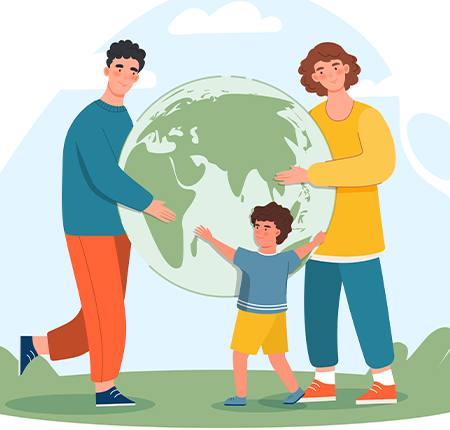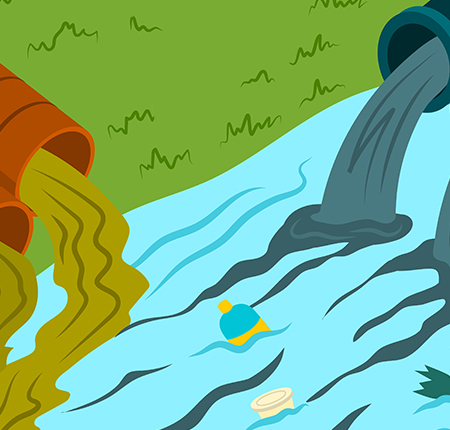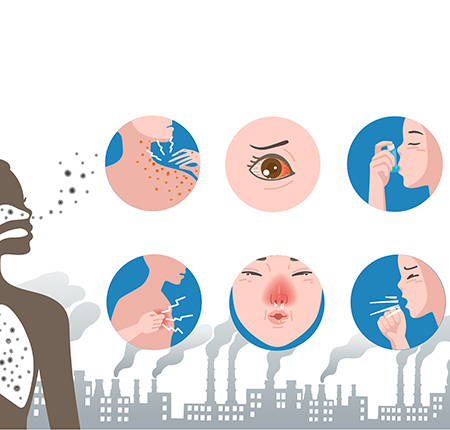
When was the last time you participated in a discussion about the environment? The truth is that many of us don't even think about the impact we have on the environment, and in doing so we are our own threat.
In the absence of sustainable choices and measures to protect the environment, we contribute to the faster destruction of the planet. Instead of judging and criticizing the various choices, today we chose to talk about it - you can draw your own conclusions. What is environmental protection and how is it done? Let's find out.
What is environmental protection?
The environment encompasses everything that is natural on the planet. Vegetation, fauna, relief, natural resources, climate, atmosphere, all living organisms and ecosystems constitute the environment.
Given that everything that lives and evolves on the globe depends directly on the environment, its protection is paramount for the survival and health of all Earth's inhabitants.
Environmental protection is therefore necessary, and consists of the measures and actions through which we protect the natural environment, conserving natural resources and reducing pollution as much as possible.

The importance of the environment
And why is the environment important to me? Why should I care?
Until we understand how important the environment is to the quality of life, all these notions, from its protection to actions to reduce pollution and climate change, seem abstract. And yet, you need a clean and healthy environment in everything you do.
Forests, waters and soil, the whole natural environment affects you in all aspects of life and is what actually maintains your survival conditions:
All our food sources are found there;
It provides us with much needed water;
It provides us with oxygen from the air we breathe;
It ensures biodiversity and genetic diversity.
We therefore have a moral duty to know how to protect nature, and to do it. First of all for your own health, but also for the protection of the ecosystem and ensuring a healthy environment for future generations.
The risks that pollution brings
Everything is interconnected in nature. And when something goes wrong - including when pollution problems arise - the effects cascade and, like dominoes, spill over the planet.
The catastrophic consequences of pollution, which primarily affect people's health, can already be observed globally.
When the air we breathe, the water we drink and use in our daily activities, and the soil from which we gather our food, are polluted, the entire ecosystem - from plants and animals to humans - suffers. Below we mention some of these consequences we face.
Air pollution
Did you know that air pollution is the leading cause of lung cancer in the US, according to the World Health Organization in 2013?
Emissions from transport, the gases we use for heating, the smoke produced by factories - all these spread toxic particles and chemicals into the air, polluting it with unhealthy substances. They also trap heat in the atmosphere, contributing to global warming.

This is how ecosystem imbalances and health problems occur in humans, animals, plants and any living organism. It's simple: we don't breathe clean air, we don't enjoy optimal health. Among the first problems that arise are:
- Cough and difficulty breathing
- Worsening of asthma symptoms
- Allergies and respiratory infections
- Lung cancer
- Cardiovascular diseases
- Low birth weight of children
Soil pollution
Polluted soil is soil that has been contaminated with toxic substances in significant concentrations. These pollutants are synthetic chemicals, meaning man-made, and come from pesticides, asbestos, petroleum products, heavy metals and other waste.
This type of contamination affects soil fertility, which is essential for much of our food supply. In other words, soil pollution threatens our safety and even survival in two main ways:
Directly, through exposure to contaminated soil, creating health problems at the immune, reproductive and cardiovascular levels, but also at the level of organs: skin, lungs, liver, kidneys.
Indirectly, through the consumption of food and drinks contaminated with chemicals, originating from too acidic or too alkaline soil, degraded by excess pesticides and chemicals.
Water pollution
Water is present everywhere in our life. We use water for survival (cooking, drinking, washing and cleaning) and for relaxation (swimming and other water sports).

This means that when water is contaminated, all aspects of our lives - including our health - are compromised. When plastic, chemicals and microorganisms from waste contaminate rivers, lakes and oceans, the negative effects cascade.
Marine life is destroyed, the food chain is contaminated with plastic microparticles, and the water becomes undrinkable. It also increases the risk of transmission of numerous diseases and infections such as cholera, hepatitis A, dysentery or poliomyelitis.
Health problems caused by pollution
The health problems that pollution causes are not negligible. Annually, for more than 12 million people, the consequence of working or living in polluted environments is death. 
Exposure, be it short-term or long-term, to an environment affected by any kind of pollution, inevitably causes serious health problems:
Cardiovascular diseases;
Respiratory diseases and infections;
Various types of cancer;
Hormonal problems;
Gastrointestinal diseases;
Disruption of the reproductive system;
Disruption of the menstrual cycle in women;
Infertility in men;
Destruction of the immune system;
Developmental problems of the nervous system in children;
Low birth weight in children;
Infant mortality or premature death.
Effective measures - How do we protect the environment?
Education. It is the first and best thing you can do to protect the environment. The only way you can be aware of how you contribute to pollution and take steps to protect the environment is to know them. If you don't know them, how do you stop them?
Only after the awareness stage comes the action stage, when we know that with every choice and action we make, we contribute to either increasing pollution or reducing it. Below are some activities to protect the environment that each of us can do.
Using biodegradable products in everyday life
More than 380 million tons of plastic and more than 29 million tons of polystyrene are produced annually worldwide. At least 500 trillion single-use plastic cups are used and then thrown away, and ultimately more than 14 million tons of plastic end up in the ocean.
These are alarming numbers, which we can drastically reduce by replacing them with products made from natural and sustainable materials, such as recyclable or biodegradable ones.
Replace plastic nets with biodegradable bags. Choose products wrapped in biodegradable packaging. Uses 100% biodegradable organic cotton pads and absorbents that only take 2 years to decompose. Such large-scale sustainable choices have incredible potential to reduce plastic pollution.

Waste collection & recycling
Do you know why we collect waste separately? When it's all together, on the ground, the methane released by rotting non-biodegradable materials contributes to global warming. The moment we separate them, they can be recycled, without ending up in the landfill.
If you wash the products before separate collection, materials such as plastic, paper and cardboard, metals, glass, etc. they can be recycled and reused, thus reducing the amount of polluting waste.
Reducing energy consumption
Energy consumption constantly pollutes the environment by exploiting natural resources and releasing toxic substances. From large office buildings and factories, to the homes of each of us, everyone can reduce energy consumption and impact on the environment.
Turning off the water when you brush your teeth, unplugging appliances when you're away from home, and turning off the lights in rooms you're not staying in are some of the ways you can reduce energy consumption.
Limiting car journeys
CO2 emissions from motor vehicles support and accelerate climate change. You can so easily reduce these effects if you limit your car journeys.
Choose cycling instead, which is also a way to keep active. Or opt for public transport. Even in Romania, more and more cities are introducing non-polluting transport through electric buses, thus reducing the impact on nature.
Reducing the consumption of animal products
And no, that doesn't mean going vegan. Reducing consumption does not mean completely giving up animal products, but only responsible consumption.
A reduction in demand will lead to a reduction in supply. Less massive fishing that destroys ocean biodiversity. Less pollution in meat processing plants. Plus, your carbon footprint can be reduced by up to 73% just by choosing plant-based products.
Don't worry, less animal foods in your diet doesn't mean creating imbalances or deficiencies. Nature has made sure that you can get all the macronutrients from sustainable plant sources as well, including vegetable fats (avocado, oils, nuts and seeds) and vegetable proteins (soy, seitan, tofu, lentils, chickpeas, peas, beans, etc.).
Waste collection volunteering
Did you know that you can participate in waste collection actions on a voluntary basis?
For example, volunteers are organized to collect waste on the beach for the protection of the Constanța environment. In Timișoara and Oradea, there were volunteers for the creation of bridges and boats from plastic sheets. Across the country, such volunteer activities reduce environmental waste pollution, contributing to healthier air, water and soils.
Responsible shopping
There are many more environmental solutions and actions you can take on an individual level, but we'll end our list by discussing what responsible shopping means. Shopping is a passion for many of us, sometimes even on the level of therapy. But for the environment, impulsive and thoughtless shopping has a negative impact.
Responsible shopping - that is, ethical and sustainable - means also considering factors such as price, quality and environmental impact in the purchase decision. In this sense, you can contribute to the protection of the environment by choosing to buy:
Products with as little plastic as possible
Things you need, when you need
Products as natural as possible, from local producers
Recyclable, organic or biodegradable alternatives
Products that are packaged as little as possible (eg: loose tea instead of tea bags)
Environmental Protection Act?
The 20th century was revelatory at the level of the entire globe, when the effects of environmental problems became evident, and their management was imminent in order to slow down the process of the degradation of nature. So both internationally and in our country, a series of environmental protection norms have been established through laws, EU regulations and Government decisions.
At European level, we have strict rules to avoid air, water and soil pollution. Including programs with objectives to combat climate change and protect the environment until 2030. Thus, EU legislation primarily regulates the conservation, improvement and protection of nature, followed by the maintenance of citizens' health by controlling environmental problems and the development of efficient economies view of the use of natural resources.
And in Romania, environmental protection is considered a major public interest. In addition to all decisions at the European level, laws were adopted for the conservation, development and protection of water resources (law 107/1996), environmental protection (OG 195/2005), reduction and prevention of the negative effects of waste from equipment electrical and electronic (Government Decision 1037/2010) and others, updated over the years.
The impact of feminine hygiene products on the environment
We cannot fail to realize that even the way we manage our menstruation matters for the environment. Studies show that annually, more than 28,000 tons of waste comes from menstrual products. Under these conditions, how responsible is it to choose conventional menstrual products?
Most conventional absorbents are actually 90% plastic, with worrying percentages of pesticides, chlorine, synthetic fibers and other chemicals. And the tampons - 6% plastic. The degradation of such a product can take between 500 and 800 years, and each woman uses more than 11,000 tampons and absorbents in her lifetime.
Considering that organic cotton takes only 1-2 years to degrade, such a sustainable choice significantly reduces environmental pollution with plastic and artificial substances.
That's why Enroush supports you in making healthy and sustainable choices, both for your body and for Mother Nature. Did you know that Enroush pads are made from 100% GOTS certified organic cotton? This means it is processed according to Global Organic Textile Standards and contains no pesticides, chlorine, synthetic fibers or other toxins, only organic cotton. 
Why choose Enroush for environmental protection?
We want to offer you menstrual care without compromise. Out of love for all women, but with care and respect for the environment. Since the beginning, our mission has been to offer you absorbent pads and tampons that protect your health with only natural ingredients. So Enroush menstrual products are made from 100% organic cotton. No hidden substances.

For your body, this means hypoallergenic menstrual care, free of irritation and allergies, which perfectly protects you against leakage with an anatomical design and 100% natural fibers in the lower layer. As for the environment, our products have a transparent and ecological circuit, for as little impact as possible and truly sustainable periods, in harmony with the natural balance of the planet.






















